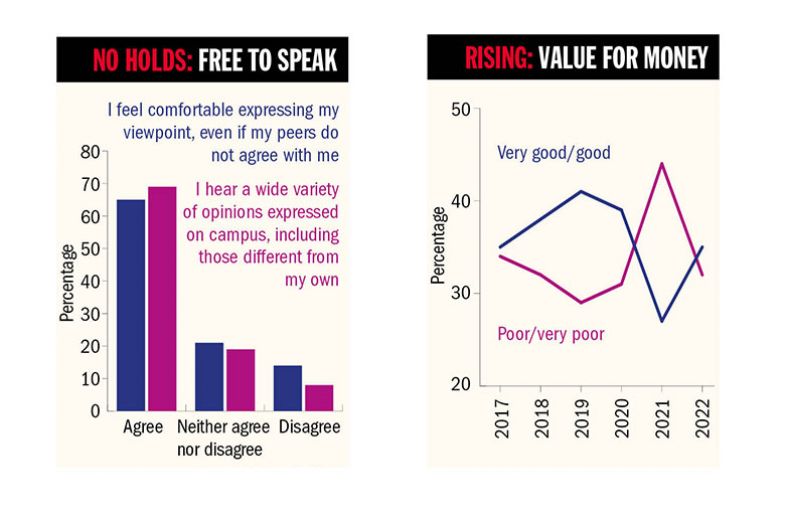The majority of students say they feel comfortable expressing dissenting views and that they have encountered a diverse range of opinions on campus despite concerns about “cancel culture” in UK universities.
This year’s Student Academic Experience Survey – run by Advance HE and the Higher Education Policy Institute (Hepi) – finds that the apparent erosion of freedom of speech in academia is not seen as a major issue among students, with 64 per cent agreeing or strongly agreeing with the statement: “I feel comfortable expressing my viewpoint, even if my peers do not agree with me.”
Only 14 per cent disagreed and a fifth (21 per cent) did not express a view either way, which the study’s authors took as suggesting that most did not feel a need to self-censor.
The poll of 10,142 undergraduates – which also finds that students’ perceptions of whether their course was good value for money have recovered somewhat after the pandemic – featured questions on freedom of speech for the first time ahead of legislation aimed at protecting open debate in English universities returning to the House of Commons.
England’s higher education minister Michelle Donelan has warned that a “small cabal of the intolerant” is intent on using “threats, intimidation and harassment” to prevent academics and external speakers airing their views at universities, something she said was “endangering our entire democracy”.
But the survey finds that the majority (69 per cent) agree that they heard a variety of opinions expressed on campus, including those different from their own, while only 9 per cent disagree.
“When we don’t have any past data, it is hard to know what good looks like. But it is a fair assumption to look at this and believe there are a number of students for whom this isn’t a major concern,” said Advance HE’s Jonathan Neves, one of the authors of the report.

Co-author Alexis Brown, Hepi’s director of policy and advocacy, said that although the overall picture appeared positive, some groups – particularly black and Asian students – are less likely to agree that they hear a wide variety of views.
Similarly, while most students feel their curriculum is sufficiently inclusive and diverse, with only 8 per cent disagreeing overall, only 56 per cent of black students agree with this statement, compared with 73 per cent of white students.
The percentage of students who say their course represents good or very good value for money – one of the most closely watched indicators in the annual survey – has recovered to 35 per cent this year, up from a decade-low of 27 per cent in 2021. At the same time, the proportion who view their course as bad or very bad value has decreased from 44 per cent to 32 per cent.
Students were polled in February 2022, when some pandemic-related disruption was still occurring, and Nick Hillman, Hepi’s director, said the data were more positive than expected.
He said that a lot of the comments from students referenced the industrial action taking place at the time – part of the University and College Union’s long-running disputes over pay and pensions – and that without this, he believed the good value for money rate could have returned to the 41 per cent level seen in 2019.
Despite seeing their courses as better value, the percentage of students who said they had considered leaving university stayed almost the same, at 30 per cent this year, compared with 29 per cent in 2021.
Mr Neves said financial difficulties appeared to have become a slightly more important factor behind this, with 6 per cent referencing money problems, and he said that this could reflect the UK’s cost-of-living crisis beginning to have an impact.
But mental health issues remain by far the biggest reason why students may have considered quitting, and the survey’s first ever question on loneliness finds that nearly one in four said they feel lonely all or most of the time.
Mr Hillman said that he had been “depressed but not entirely surprised” by these statistics and called on universities to think more closely about how to engage students, including by holding “re-freshers’ weeks” and boosting support to societies and students’ unions.
后记
Print headline: Most students happy with freedom of speech: survey





